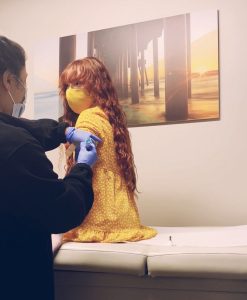30 Days of PH: Dealing With The Elephant in the Room - Pulmonary Hypertension News
30 Days of PH: Dealing With The Elephant in the Room - Pulmonary Hypertension News |
- 30 Days of PH: Dealing With The Elephant in the Room - Pulmonary Hypertension News
- Year in Review: Pulmonary Arterial Hypertension - MedPage Today
- 30 Days of PH: Planning for the Future - Pulmonary Hypertension News
| 30 Days of PH: Dealing With The Elephant in the Room - Pulmonary Hypertension News Posted: 29 Nov 2020 07:00 AM PST Day 29 of 30 Days of PH This is Skarlette's Story @skarletteisdead In December 2015, I was diagnosed with pulmonary hypertension and heart failure. My diagnosis did not come easily. I'd been struggling for a long time and it took multiple doctors, three hospitals, seemingly endless tests, and a lot of hard conversations to finally find out what was wrong. And while having an answer closed one door, it opened another. I was researching clinical trials and palliative care options when my friends were researching colleges and getting their first jobs. My declining health quickly became the elephant in every room. I've always been both a pessimist and a perfectionist, so I immediately began planning every detail of my funeral. Literally. My friends joked that I was having a teenage midlife crisis, but planning was strangely cathartic. I guess it was my way of coming to terms with the fact that in many ways, PH is a death sentence. It's not pretty. It's painful, it's violent, and it's terrifying. I used to think doctors could do anything and save anyone. Naive, right? But 17-year olds don't want to think about things like that. After all, that's 'old people stuff', as my high school boyfriend said. Then I realized that sometimes even the best doctors and drugs can't save you. After finishing my end of life plans, I made what is possibly the most boring bucket list ever. Ordinary things became a goal because I craved normalcy and was too sick to do the big things. I managed to cross off every single thing on that list, and then something unexpected happened. Almost five years later, I'm still here. I made it to adulthood, and that's a miracle. I've since managed to find some stability, and I am grateful to even be writing this. I'm still a "worst-case scenario" type of person and my body is pretty much a walking train wreck, but that body still stands despite the pain it has endured. I've accepted that my life will always look different from others whether I die tomorrow or live to be 60. After so many years of planning and being terrified of what my future might hold, it's time for me to live in the moment. Follow us on social media! Colleen Steele was born and raised in New Jersey and received a Bachelor of Arts in English from Immaculata University in 1994. Currently, she lives in Washington state with her husband and two sons. Her oldest child was diagnosed with idiopathic pulmonary arterial hypertension when he was 8. At the age of 14, he received a heart and double-lung transplant. He has experienced many bumps in the road but for the most part, he is doing well and living life to the fullest. Colleen's love for writing, experience advocating for her son, and determination to spread PH awareness inspired her to become a columnist and forums moderator for Pulmonary Hypertension News in 2019. In her, "Life As A Caregiver" column, Colleen is open and honest about caring for her son, his experiences living with PH, and life post-transplant. It is her ambition to educate and inspire others facing similar challenges that her family has battled and survived. × Colleen Steele was born and raised in New Jersey and received a Bachelor of Arts in English from Immaculata University in 1994. Currently, she lives in Washington state with her husband and two sons. Her oldest child was diagnosed with idiopathic pulmonary arterial hypertension when he was 8. At the age of 14, he received a heart and double-lung transplant. He has experienced many bumps in the road but for the most part, he is doing well and living life to the fullest. Colleen's love for writing, experience advocating for her son, and determination to spread PH awareness inspired her to become a columnist and forums moderator for Pulmonary Hypertension News in 2019. In her, "Life As A Caregiver" column, Colleen is open and honest about caring for her son, his experiences living with PH, and life post-transplant. It is her ambition to educate and inspire others facing similar challenges that her family has battled and survived. Latest Posts |
| Year in Review: Pulmonary Arterial Hypertension - MedPage Today Posted: 28 Nov 2020 09:04 AM PST  The year in pulmonary arterial hypertension (PAH) brought hope for new treatments on the horizon and ready to cross the finish line. Novel Sotatercept PAH patients with treated with the investigational drug sotatercept showed significant improvements in pulmonary vascular resistance (PVR) and 6-minute walk distance in phase II findings from the PULSAR study presented at the virtual American Thoracic Society (ATS) meeting. At week 24, the 0.7 mg/kg dose cut PVR by a relative 33.9%, compared with a 2.1% reduction in patients in the placebo group (P<0.0001). Sotatercept is the first in a new class of fusion proteins designed as a selective ligand trap for the TGF-beta superfamily to rebalance pro- and anti-signaling pathways for the serine receptor kinase bone morphogenetic protein receptor type II (BMPR-II), a key molecular driver of PAH. Initial data from 10 PAH patients in the ongoing phase II SPECTRA trial of sotatercept reported at the virtual American Heart Association meeting showed PVR decreased from 576 dyn-sec/cm5 at baseline to 369 dyn-sec/cm5 at 24 weeks. Acceleron announced it would start the phase III STELLAR trial of sotatercept in PAH by the end of 2020 with two other trials of early and later-stage intervention coming in 20210. Inhaled Treprostinil Another development of note was release of results from the phase III INSPIRE trial, testing a novel inhaled dry powder formulation of treprostinil for PAH. Exploratory analyses from that trial presented at the virtual ATS meeting showed significant quality of life benefits to the inhaled prostacyclin vasodilator along with better 6-minute walk distance (6MWD). Inhaled treprostinil also improved exercise capacity in patients with pulmonary hypertension and interstitial lung disease in the phase III INCREASE trial. The drug increased 6MWD by 21 meters more than seen with placebo after 16 weeks (P=0.0043) in findings reported at the virtual ATS meeting. Martin Kolb, PhD, of McMaster University in Ontario, told MedPage Today that the findings offer more evidence that targeting the blood vessels can be an effective strategy for addressing fibrosis. "The lung is made up of both air tubes and blood vessels, and much of the research has been focused on either one or the other. But there is close interaction between the two." Developer Liquidia Technologies applied to the FDA for marketing approval, but on Nov. 25, the agency turned it down, citing manufacturing and "device biocompatibility" issues. Liquidia said additional trials should not be necessary to win final approval. Other Research For the first drug regimen in newly-diagnosed PAH, triple oral therapy with selexipag (Uptravi), macitentan (Opsumit) and tadalafil wasn't better than double drug therapy with macitentan and tadalafil for hemodynamics, NT-proBNP, or functional capacity at 26 weeks in the TRITON trial. In a proof-of-concept study, PAH patients had a unique gut microbiome profile -- heavy on Coriobacteriales bacteria associated with trimethylamine (TMA)/trimethylamine N-oxide (TMAO) and purine production. Altogether, the presence and absence of 30 individual bacterial species pinpointed presence of PAH with 83% accuracy. Some potential biomarkers of PAH "could be derived from altered bacterial functions in patients with PAH," the researchers concluded. "Therefore, identification and characterization of PAH specific bacteria and metabolites in both gut and lung hold promise for the development of innovative strategies for the control and treatment of PAH by modification of diet, prebiotics, microbiota transplantation, and pro/antibiotics." In a separate study, women who took sildenafil (Viagra) during pregnancy to treat fetal growth restriction did not see reduced risk of morbidity and mortality in their babies but was linked to 3.67-fold elevated risk of neonatal pulmonary hypertension as a complication in a randomized clinical trial from the Netherlands. A systematic review of pulmonary hypertension rehabilitation studies suggested expanding outcome measures beyond just body function and structure to also reflect physical activity and participation in society. Kickback Crackdown The Justice Department's crackdown on alleged kickbacks continued to impact PAH drugmakers this year. Gilead Sciences agreed to pay $97 million to resolve claims that it violated the False Claims Act by allegedly using a charitable foundation to pay the copays of Medicare patients taking ambrisentan (Letairis). "Like its competitors, Actelion and United Therapeutics, Gilead used data from CVC [Caring Voice Coalition] that it knew it should not have, and effectively set up a proprietary fund within CVC to cover the co-pays of just its own drug," according to a Justice Department press release. "Such conduct not only violates the anti-kickback statute, it also undermines the Medicare program's co-pay structure, which Congress created as a safeguard against inflated drug prices. During the period covered by today's settlement, Gilead raised the price of Letairis by over seven times the rate of overall inflation in the United States." Gilead, however, did not admit guilt in the settlement agreement. United Therapeutics had settled similar allegations in 2017 for $210 million related to its PAH drugs, including tadalafil (Adcirca) and treprostinil (Remodulin, Tyvaso, and Orenitram). And facing such charges as well, related to its bosentan (Tracleer), iloprost (Ventavis), epoprostenol (Veletri), and macitentan (Opsumit) products, Actelion reached a settlement for $360 million in 2018. |
| 30 Days of PH: Planning for the Future - Pulmonary Hypertension News Posted: 01 Nov 2020 07:00 AM PST Day 1 of 30 Days of PH This is Hannah's story @hrolsn I've always been a planner; I dream about the future, I make lists, I research all my options and then I make it happen. At 19 years old I was going constantly, a full time student, involved in several organizations, working part time, really enjoying my freedom and thinking about what I thought the next season of my life would be all about. Then I was diagnosed with Pulmonary Arterial Hypertension. I had never felt fear like that before and, while I am so grateful to have access to the best doctors (shout out UTSW in Dallas) and effective medications, I was dreading all of the losses I knew were heading my way. It felt like my future had dimmed and all of my ambitions now had to be tailored to include doctors, treatment (so many medications) and endless testing. These changes were not welcome, and I really struggled with depression and fear. Well, I've been a PAH-er for 8 years this December and during that time I've gotten married, moved to a new state, graduated with my bachelors and master's in social work and earned my LMSW. I become a foster parent to a sweet, sweet babe, and am closer to God, my family, and friends; because of and despite the hardships chronic illness has brought. PAH and subcutaneous remodulin have created some incredible challenges. Some losses can't be planned around but the future for PAHers is still bright! I hope everyone, chronic illness in tow, is able to work towards one ambition this year. Follow us on social media! Colleen Steele was born and raised in New Jersey and received a Bachelor of Arts in English from Immaculata University in 1994. Currently, she lives in Washington state with her husband and two sons. Her oldest child was diagnosed with idiopathic pulmonary arterial hypertension when he was 8. At the age of 14, he received a heart and double-lung transplant. He has experienced many bumps in the road but for the most part, he is doing well and living life to the fullest. Colleen's love for writing, experience advocating for her son, and determination to spread PH awareness inspired her to become a columnist and forums moderator for Pulmonary Hypertension News in 2019. In her, "Life As A Caregiver" column, Colleen is open and honest about caring for her son, his experiences living with PH, and life post-transplant. It is her ambition to educate and inspire others facing similar challenges that her family has battled and survived. × Colleen Steele was born and raised in New Jersey and received a Bachelor of Arts in English from Immaculata University in 1994. Currently, she lives in Washington state with her husband and two sons. Her oldest child was diagnosed with idiopathic pulmonary arterial hypertension when he was 8. At the age of 14, he received a heart and double-lung transplant. He has experienced many bumps in the road but for the most part, he is doing well and living life to the fullest. Colleen's love for writing, experience advocating for her son, and determination to spread PH awareness inspired her to become a columnist and forums moderator for Pulmonary Hypertension News in 2019. In her, "Life As A Caregiver" column, Colleen is open and honest about caring for her son, his experiences living with PH, and life post-transplant. It is her ambition to educate and inspire others facing similar challenges that her family has battled and survived. Latest Posts |
| You are subscribed to email updates from "pulmonary hypertension diagnosis" - Google News. To stop receiving these emails, you may unsubscribe now. | Email delivery powered by Google |
| Google, 1600 Amphitheatre Parkway, Mountain View, CA 94043, United States | |





Comments
Post a Comment